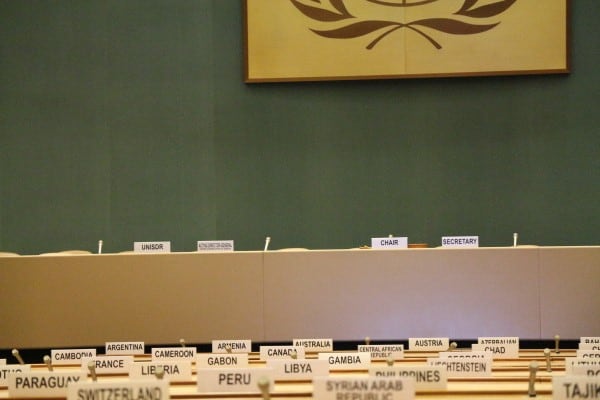This page contains affiliate links. This means if you a follow a link and make a purchase, at no additional cost to you, Humanitarian Careers will receive a commission. Thank you for supporting the site.
There are 193 member states of the United Nations. This means almost every country in the world is represented. However, many nations have had disagreements with the UN. There have been many threats from countries to leave, but have any gone through with it? And if they did, can a country actually leave the United Nations?
It is technically not possible for a member state to leave the United Nations. There is no provision in the UN Charter for a nation’s withdrawal. However, countries can stop cooperation with the UN or leave specific UN agencies such as the WHO or UNESCO, but they still remain a UN member state.
The main reason nations cannot officially leave the UN is to prevent countries using withdrawal as a way to gain leverage in international affairs or to weaken the UN itself. Allowing states to exit was a major failure of the UN’s predecessor – the League of Nations, which essentially became ineffective prior to World War Two when Japan, Italy and Germany left. To stop this from happening again, the UN did not include a mechanism for states to withdrawal.
Although countries cannot actually leave the UN, there are other ways that a state can stop being a member of the United Nations. We’ll look at the different scenario, but first, let’s explore why a country would even want to depart the UN…
Why Would a Nation Want to Leave the United Nations?
There are four main reasons why a country would want to leave the United Nations. Let’s take a look at each.
The first reason countries have said they want to depart from the UN is because they have disagreements with what the UN is doing. Nations have also threatened to leave the UN because they don’t like criticism the UN is making of them, or they accuse the UN of medalling in their affairs. An example of this is the threats by Philippines President Duterte to leave the UN over criticism of his war on drugs.
The second reason countries have given for wanting to exit the United Nations is because they see the UN as favouring a rival country, or they have a dispute with another nation that they feel the UN is unfairly taking a stance on. This is what happened when Indonesia tried to leave the United Nations in year over their dispute with neighbouring Malaysia.
Another reason nations can have for wanting to pull out of the UN is because they adopt of policy of isolationism. This is where a country’s government decides to limit their engagement with the outside world and focus almost entirely on their domestic agenda. Countries have wanted to leave, or limit support for, the UN because they see it as pulling them into foreign affairs.
An example of this was the USA in the 1920s and 30s, who withheld members shop of the UN’s predecessor, the League of Nations, because they followed a policy of isolationism.
The final reasons countries give for wanting to leave the United Nations is because they plan to pursue a policy of unilateralism. This is when countries act alone and without cooperation with other nations. Exiting the UN is seen as a strong declaration of unilateralism because it means the country has rejected international diplomacy and officially made moves to end formal dialogue with other countries in regarding to external affairs.
There are some in America who wish the country took a unilateral approach to foreign policy and have tried to push through laws withdrawing the US from the United Nations. This is a prime example of wanting to leave the UN due to unilateralism.
United Nations Online Courses
If you want to learn more about the United Nations, and if a country can leave it, we highly recommend the online course Global Diplomacy: The United Nations in the World offered by SOAS in London. We think it provides one of the best overviews of the UN and its role in the current global order. SOAS is also one of the top universities in the world for international relations and courses related to the UN.
The Sustainable Development Goals (SDG) underpin all of the UN’s work. In order to fully understand the United Nations, and if a country can exit from it, you need a basic understanding of the SDG. We think the online short course The Sustainable Development Goals – A Global, Transdisciplinary Vision For The Future offered by the University of Copenhagen is one of the best introductions to the SDG.
The University of Leiden in the Netherlands offers an online short course on The Changing Global Order. It includes a specific look at how shifting international power dynamics are affecting the current global system and the United Nations. For those wanting to understand the challenges the UN faces, this online course is a must.
Countries Withdrawing from UN Agencies
Although countries cannot officially leave the United Nations and stop being member states, they can end support for specific UN agencies. This is not quite the same as exiting though.
When a country withdrawals from a UN agency, it usually means they end financial support and cease participation in any programmes ran by that agency. It can also mean they don’t follow any guidelines or regulations set-out by the UN agency.
United Nations agencies, such as UN High Commission for Refugees (UNHCR), the World Health Organisation (WHO) or the UN Palestinian relief agency (UNWRA) are not made up of member states. This is why a country can’t actually leave a UN agency. However, they are funded by contributions from countries and nations offer their support to many UN agencies.
An example of a country leaving a UN agency is America’s departure from UNESCO – the UN’s heritage organisation. In 2011, the US announced it was leaving UNESCO. This included stopping all funding and ending participation in UNSECO’s scientific and environmental programmes.
Another example of the state leaving a UN agency is also the US exit from the WHO. Following controversy over the WHO’s handling of the Covid-19 pandemic, the American government ended all funding to the WHO.
Although in both these cases it was said that the US had left these agencies, in fact that isn’t really correct. Ending support for a UN agency and removing a country from its programme is not the as leaving. As we said, UN agencies don’t have member states, so countries can’t actually leave them.
Importantly, throughout all the time the US was not participating in UNESCO or the WHO, it still remained a full United Nations member state.
The First Country to (Try and) Withdrawal from the United Nations
Indonesia is the first, and only, country to try and voluntarily leave from the United Nations. In 1965, due to ongoing tensions with Malaysia, Indonesia threatened to withdrawal the UN if Malaysia did not lose its place on the Security Council. When the UN did not comply, Indonesia officially announced its departure in a letter to the Secretary General.
However, as the UN’s Charter does not have provisions for the withdrawal of a member state, essentially Indonesia’s declaration had no meaning. Although Indonesia ceased to engage with the United Nations during the time it said it has left, in fact it was still technically a UN member state.
In 1966, there was a coup in Indonesia that overthrew the government. The new regime informed the Secretary-General that Indonesia would “resume full cooperation with the UN and […] resume participation in its activities.”. Many see Indonesia’s attempt to leave the UN as a pause in cooperation, rather than a full withdrawal.
After the Secretary-General recommended that no formal process should be completed to readmit Indonesia into the United Nations, the country resumed its full place within the UN immediately, as if it hadn’t left.
The Only Country to Get Kicked-Out of the UN
If countries cannot really pull-out of the United Nations, it begs the question, is it possible for a country to be kicked-out? In fact, one has…
Taiwan, officially known as the Republic of China, is the only country to have been kicked-out of the UN. This was done in 1971 when the United Nations member state for China was officially transferred from the Republic of China, based in Taiwan, to the People’s Republic of China, who govern the mainland.
In 1945, when the United Nations was created, the founding states and permanent seats on the Security Council were given to the victorious nations of World War Two. The Republic of China had fought extensively against Japan throughout the war and so was invited to join the UN from the beginning.
Following the end of the Second World War, China was plunged into civil war between the Nationalist Republican forces who officially governed the country, and the Communists.
By 1949, the Chinese Civil War was over, and the Communists had won. Having lost control the mainland China, the Republicans fled to the Island of Taiwan where they continued to claim to be the official government of China.
Although no longer in control of almost the entire country, the Republic of China government kept the United Nations seat for China. That was until 1974 when the UN ratified Resolution 2758, switching the UN member state status from the Republic of China to the People’s Republic of China. This followed the normalisation of diplomatic ties between the US and the Chinese People’s Republic.
So why was Taiwan, the Republic of China, kicked-out of the UN?
Resolution 2758 of the United Nations stated that the People’s Republic of China is ‘the only legitimate representative of China to the United Nations’. It also added that there was only one China and that Taiwan was an ‘inalienable part of Chinese territory’. This meant Taiwan had to be removed and be replaced with the Communist People’s Republic.
Why did the UN agree to the People’s Republic being the only China? Well, pressure from member states aligned to the PRC, especially Communist allies, played a part in forcing UN Resolution 2758 through. There was also a view among many nations that the PRC was a dominant force in the world and there was a need to engage with it diplomatically. As US relations with the PRC improved, especially as the relationship between the PRC and Soviet Union deteriorated, America also became vital in pushing through Resolution 2758 and essentially kicking Taiwan out of the UN.
Countries That Are No Longer in the United Nations
Although only one country has, sort-of, left the UN and only one nation has been kicked-out, there are some countries that used to be in the UN that aren’t any more. These are countries that basically no longer exist.
An example of a country that is no longer in the United Nations is the Soviet Union. The Soviet Union joined the UN when it was founded in 1945 and was given a seat on the Security Council as one of the victorious nations of World War Two. However, in 1991 the Soviet Union dissolved, and Russia took its place in the United Nations. Although the Soviet Union broke-up into 15 independent nations, it was agreed that Russia would take the Soviet Union’s seat within the United Nations. All the newly independent nations either also joined the UN at that time or did so shortly after.
Another example of a country that is not part of the UN any more is Yugoslavia. Like the Soviet Union, Yugoslavia joined the UN when it was formed in 1945. However, during the 1990s Yugoslavia disintegrated in a series of violent conflicts. The result, after the fighting, was six fully independent republic. Serbia, Slovenia, Croatia, Montenegro, Bosnia and Herzegovina, and North Macedonia have all since joined the UN. The independent nation of Kosovo also came out of Yugoslavia when it broke away from Serbia in year. However, it has not been blocked from joining the United Nations.
A final example of a country that is no longer part of the United Nations is Czechoslovakia. It joined the United Nations in 1945 but when Czechoslovakia split to form the independent states of the Czech Republic and Slovakia in 1993, it ceased to be a member of the UN. Both countries joined the United Nations later that year.
If you want to learn more about the United Nations, and if a country can leave it, explore our list of the top UN online courses here.




